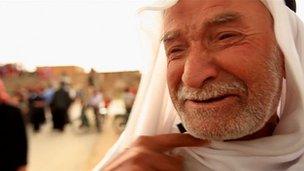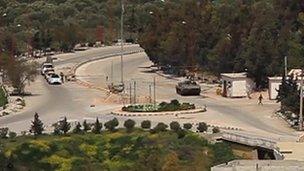Fear and defiance amid Syria ceasefire
- Published
UN monitors have arrived in Syria to oversee a shaky ceasefire but the guns have not fallen silent and people are fearful, as the BBC's Ian Pannell observed when he secretly visited the northern province of Idlib.
Ahmed Al-Aboud's body bears the scars of the struggle for change in Syria.
He joined the Free Syrian Army but was detained at a checkpoint in Saraqib, Idlib province, three months ago. He says the government forces that captured him started by beating him, then they shot him and finally they set fire to his bleeding body and left him for dead.
His face, body and arms are disfigured and he pulled his robe to one side to show two clear bullet marks.
That he is alive is remarkable but we met the father of eight at a public protest in an area where government forces had been active just a few days ago.
"I am not afraid, I will sacrifice my soul and my life to get rid of [Syrian President] Bashar al-Assad," he says.
His defiance is typical of the people we have met in Idlib.
That does not mean they are not afraid.

Civilians fear the advance of government troops into rebellious areas
They have borne the brunt of a ferocious government assault that swept through Idlib from March into early April.
A frail elderly man with piercing blue eyes, his head swaddled in a keffiyeh, wept openly as he talked about what he called "Bashar's army". Abdul Aziz slashed his hand across his throat in a cutting motion, saying: "They will kill all of us".
We have travelled through villages and towns where buildings had been flattened and countless homes looted and burned.
Those suspected of belonging to the rebel Free Syrian Army have been rounded up and killed, we are told. Activists have been detained and tortured and many innocent civilians have lost their lives, too, the rebels say.
We have been shown mass graves and gruesome videos of corpses lain out for identification.
An uneasy calm has settled over the province. Although the violence has subsided and many troops have returned to barracks, each day brings fresh allegations of government attacks.
It is impossible to verify these reports but we have seen President Assad's forces operating in one town, accompanied by the intermittent sound of gunfire.
It is a far from perfect ceasefire and the challenge for the UN monitors may not be just verifying but trying to persuade both sides to abide by UN-Arab League envoy Kofi Annan's six-point plan. There is little optimism in the areas we were able to visit that it will work.
"We are Syrian people and our crime is to call for freedom," says Ahmed al-Aboud.
He does not think the government will honour its pledges. As with everyone we met, there is a bitter sense that they have been abandoned by the world.
Armed insurrection
"The international community, the Arab League, Europe, America, they all disappointed us," he says.
If there is an opportunity for the West to recast its image in the Arab world, it seems to be disappearing fast.
Money has been pledged for non-military aid but in this part of the country the only evidence of any assistance on the ground is a few walkie-talkies.
The armed insurrection may have proved no match for the overwhelming firepower of the government but the popular rebellion seems undiminished.
The withdrawal of military forces in many parts has allowed people to take to the streets once again; gathering, chanting and singing in the name of freedom and the overthrow of a party and family that has ruled over them for generations.
Herein lies the conundrum of Kofi Annan's plan.

Not all government forces have withdrawn from residential areas
It calls for a political process to address the aspirations and concerns of the Syrian people. Yet the difference between what the opposition wants and what President Assad is prepared to agree to is greater than ever.
The lasting effect of the violent assault in this area is to harden positions and make compromise almost unthinkable.
We are unable to travel to pro-government areas but they do exist.
Not all Syrians are enamoured with the Free Syrian Army and the crowds that gather to protest.
Some fear they are part of an Islamist takeover, that hardline Sunni extremists want to seize power and establish a government that will not respect minorities.
There is certainly a history of tension between the Sunni Muslims who live here and their Alawite rulers, a heterodox off-shoot of Shia Islam.
Ahmed Al-Aboud's father was held in prison for more than 25 years, detained in a crackdown on suspected Islamists in this region in the early 1980s.
We have heard the same thing from many others here; stories about their relatives, accused of being members of the Muslim Brotherhood, arrested, imprisoned and beaten.
It has created a spirit of defiance in Idlib and a vow that this time will be different. Perhaps that explains their determination to resist, whatever the odds.
If there is to be peace it must be made with people here and in Homs, Deraa and elsewhere.
The violence unleashed by President Assad's men has only made that prospect more remote. Enforcing the peace will be hard for the UN but finding a lasting political settlement will test all of Mr Annan's diplomatic skills.